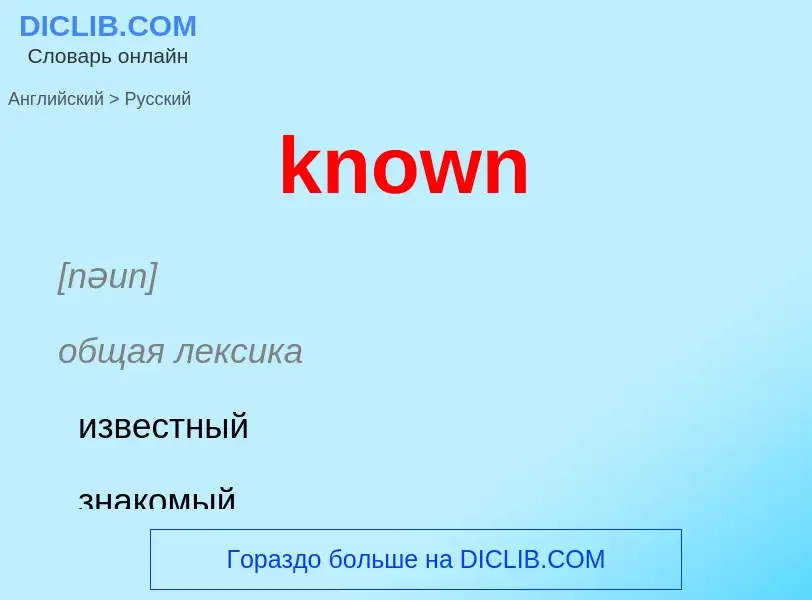Traducción y análisis de palabras por inteligencia artificial ChatGPT
En esta página puede obtener un análisis detallado de una palabra o frase, producido utilizando la mejor tecnología de inteligencia artificial hasta la fecha:
- cómo se usa la palabra
- frecuencia de uso
- se utiliza con más frecuencia en el habla oral o escrita
- opciones de traducción
- ejemplos de uso (varias frases con traducción)
- etimología
known - traducción al Inglés
[nəun]
общая лексика
известный
знакомый
прилагательное
[nəun]
общая лексика
общеизвестный
общепризнанный
past participle от known
известный
Definición
Wikipedia

Knowledge is a form of awareness or familiarity. It is often understood as awareness of facts or as practical skills, and may also mean familiarity with objects or situations. Knowledge of facts, also called propositional knowledge, is often defined as true belief that is distinct from opinion or guesswork by virtue of justification. While there is wide agreement among philosophers that propositional knowledge is a form of true belief, many controversies in philosophy focus on justification: whether it is needed at all, how to understand it, and whether something else besides it is needed. These controversies intensified due to a series of thought experiments by Edmund Gettier and have provoked various alternative definitions. Some of them deny that justification is necessary and suggest alternative criteria while others accept that justification is an essential aspect and formulate additional requirements.
Knowledge can be produced in many different ways. The most important source of empirical knowledge is perception, which is the usage of the senses. Many theorists also include introspection as a source of knowledge, not of external physical objects, but of one's own mental states. Other sources often discussed include memory, rational intuition, inference, and testimony. According to foundationalism, some of these sources are basic in the sense that they can justify beliefs without depending on other mental states. This claim is rejected by coherentists, who contend that a sufficient degree of coherence among all the mental states of the believer is necessary for knowledge. According to infinitism, an infinite chain of beliefs is needed.
Many different aspects of knowledge are investigated, and it plays a role in various disciplines. It is the primary subject of the field of epistemology, which studies what someone knows, how they come to know it, and what it means to know something. The problem of the value of knowledge concerns the question of why knowledge is more valuable than mere true belief. Philosophical skepticism is the thesis that humans lack any form of knowledge or that knowledge is impossible. Formal epistemology studies, among other things, the rules governing how knowledge and related states behave and in what relations they stand to each other. Science tries to acquire knowledge using the scientific method, which is based on repeatable experimentation, observation, and measurement. Many religions hold that humans should seek knowledge and that God or the divine is the source of knowledge.


![Ciudad Universitaria, Madrid, Spain]]) Ciudad Universitaria, Madrid, Spain]])](https://commons.wikimedia.org/wiki/Special:FilePath/File-Los portadores de la antorcha.jpg?width=200)

![[[Saraswati]] is the goddess of knowledge and the arts in Hinduism. [[Saraswati]] is the goddess of knowledge and the arts in Hinduism.](https://commons.wikimedia.org/wiki/Special:FilePath/Saraswati - Raja Ravi Varma.jpg?width=200)
